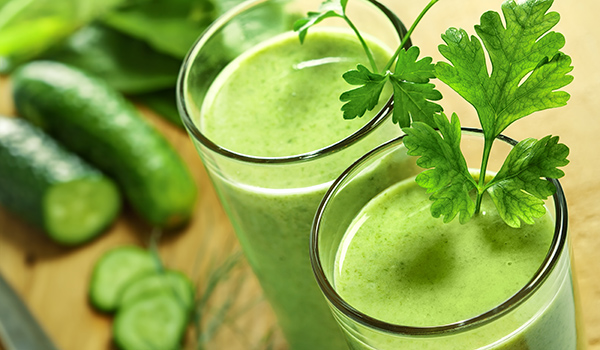
What is juicing and what are the health benefits of juicing that you can derive from it? If you’ve ever heard about juicing but are unclear about how it could benefit you, in today’s blog post you will learn exactly what it is and how you benefit from it. Juicing refers to extracting the liquid that is found naturally in fruits and vegetables. Juicers have the ability to separate the fruit or vegetable pulp from the liquid.
Juicing is different from pulverizing (making a smoothie) in the sense that smoothies still contain the pulp along with the juice that naturally exists in the fruit.
And while one option is not necessarily superior to the other, it is important to note that with a smoothie, your body still has to break down the pulp/fiber in addition to absorbing the essential nutrients from the fruit/vegetable mixture. With a juice however, your body is able to get those nutrients quickly without the hassle of breaking down the fiber.
The Health Benefits Of Juicing
Get the vitamins and minerals you need
Perhaps you’re reading this post because you hate eating fruits or vegetables. But you know how rich they are in vitamins and minerals and would still like to get those benefits of juicing.
If this is the case, juicing could be a great way for you to get all the nutrients you need without having to chew a fruit or vegetable.
With juicing your body will gain access to Vitamin A, Vitamin C, Vitamin K, potassium, zinc and a myriad of other vitamins and minerals in one shot-depending on the ingredients you use. A daily juice habit is enough to provide you with all the benefits these nutrients provide.
Here some of the functions of the vitamins and minerals in juices that you can look forward to.
- Vitamin C (citrus fruits, kale, broccoli) – Boosts the immune system
- Vitamin K (parsley, kale, dark green vegetables) – Supports bone health
- Potassium (bananas, apricots, cantaloupe) – Supports heart health
- Vitamin B1(legumes like beans and peas) – Several benefits including supporting strong muscles
- Fisetin – Supports brain health
- Beta-carotene (Carrots, sweet potatoes, spinach) – Beta-carotene is known to improve eye health
- Vitamin B5 (broccoli, peanuts) – Reduces stress and anxiety
- Vitamin B7 (avocado, nuts and seeds) – Supports metabolism which increases your energy
- Manganese (spinach, pineapple, pumpkin seeds) – Manganese is an antioxidant that also supports bone health
Boosts the immune system
Juices are rich in anti-inflammatory compounds that boost the immune system. As you get older, our immune systems need boosting to efficiently fight infections that would otherwise keep you out of work.
Juicing as a detoxifier
It doesn’t take much to realize that a lot of the foods and drinks we put into our bodies are also the source of many health problems that may not have existed as recent as 50 years ago.
Your liver is responsible for getting rid of the toxins that enter your body through food and drink. However, juicing could help your liver along with this activity. How?
Well, because you will be adding more liquid to your diet with the juices this will allow your body to produce more urine. When your body produces more urine, it flushes out toxins that may have built up in your body.
Additionally, the juice can help improve peristalsis, the movement of food through your intestines and this can help with helping you eliminate waste from your body efficiently.
Weight loss
Because juices are low in calories, juicing will also help with weight loss.
Good gut bacteria
In a study published in Scientific Reports, researchers found that juicing can increase health-promoting bacteria in the intestines of participants while decreasing the number of bacteria that cause illness.
Does juicing have risks?
Fruits and vegetables are good for you so why would there be any risks? Well, even good things become bad when they are abused.
With so many people wanting to lose weight, it is not uncommon for companies to selling juicing as a catch-all weight loss program for anyone. However, the truth is that, when it is overdone, juicing may be dangerous for some people. For instance, because certain fruits are high in oxalate, juicing may pose a risk for kidney stones for people with kidney problems.
Apart from kidney stones, oxalate in large quantities will cause serious damage to the kidneys. If you decide to go on a fast that exclusively involves juicing, you could be missing out on other essential proteins and experience extreme hunger, headaches, low blood sugar and fainting.
Plus, losing weight this way is hardly sustainable. If you’re going to use juicing as a weight loss strategy, it will be helpful to include it as a habit alongside eating a balanced diet and exercise.
Some people use laxatives alongside juicing as a way to lose weight. This is dangerous as it can lead to dehydration and electrolyte imbalance.
Everything is good in moderation and juicing is no different.
How much will it cost you to juice?
Like we mentioned at the beginning of this post, juicing is different from making a smoothie. Juicing requires juicing machines that can cost anywhere between $50 and as high as $500. Some juicers are large and may not fit into your cabinet or storage space. This is something to consider as you choose a juicer.
The benefits of juicing are clear. And it is important to be mindful of the risks especially if you have kidney problems. All in all, with moderation, juicing can be an excellent healthy habit.

